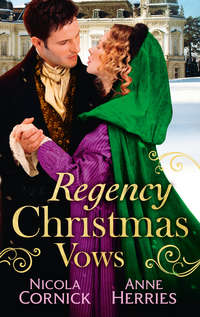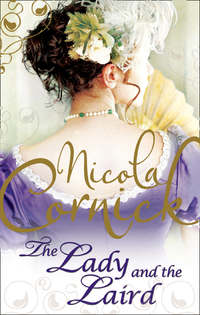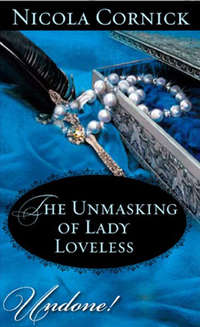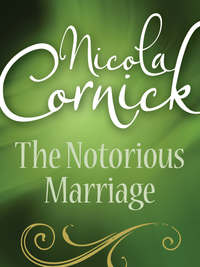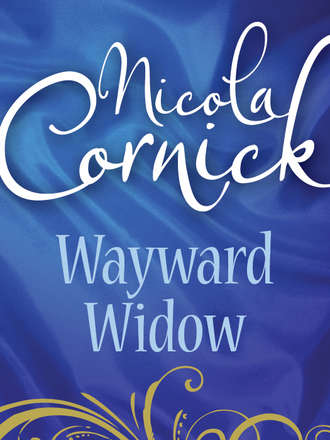
Полная версия
Wayward Widow
Juliana felt a shiver go through her. She did not like his observation. It accorded too closely with what she had seen earlier in the mirror. ‘It is a very useful accomplishment, I assure you,’ she said flippantly. ‘The gentlemen find it fascinating that I am able to play the innocent. Many a Cyprian has asked me how I manage it. I believe they charge a great deal for false virtue.’
She saw the expression in Martin’s eyes harden. ‘You are very cool, I will say that for you, Lady Juliana. Nevertheless, I am offering a word of advice. If you proposition a gentleman, be sure that you are prepared to deliver on your promise. Otherwise it brands you a cheat.’
Once again Juliana felt a rush of annoyance. ‘Two pieces of advice in one evening,’ she said, in honeyed tones. ‘You should charge for your opinions, Mr Davencourt. You might make a fortune. Then again…’ she pulled a face ‘…perhaps not. You are not very interesting.’
Martin Davencourt laughed. ‘You used to be such a sweet girl, Lady Juliana. Whatever happened to you?’
Juliana paused, looking at him through narrowed eyes. ‘Are you trying to claim a previous acquaintance with me, Mr Davencourt?’
She saw the flash of Martin Davencourt’s teeth in the darkness as he laughed. ‘I am not trying to claim anything, Lady Juliana. I suppose you do not remember our previous meeting. Let me remind you. We met at Ashby Tallant, by the pool under the willows on those long hot summer days. You were fourteen years old and a very sweet and unspoilt child. Whatever happened to change that?’
Juliana turned away. ‘I expect I grew up, Mr Davencourt. I would like to say that I remember you, too, but I do not.’ She raised a brow. ‘I wonder why that would be?’
Martin Davencourt held her gaze for a long moment and Juliana found herself fidgeting under his scrutiny, her cheeks growing hot. She was about to burst into speech, any speech, to ease the discomfort of that moment, when she heard the sound of the clatter of hooves on the cobbles as the coach was brought round. Seldom had she felt so relieved to escape a situation.
‘Oh! My carriage, I think.’
Martin smiled. ‘How timely. Enabling you to run away yet again, Lady Juliana.’ He held the door open for her courteously. ‘Goodnight.’
He followed her out through the door and with a negligent wave of the hand he strolled away down the street.
Juliana paused, staring after him into the darkness, her foot poised on the carriage step. She was used to people trying to scrape an acquaintance—they were usually gentlemen—but Martin Davencourt hardly struck her as the type. He had made it plain that he did not admire her. Yet if they had really met as children it might explain that peculiar sense of recognition that possessed her whenever he was nearby.
The touch of raindrops on her face recalled her to the present and she climbed up into the coach, leaning forward to draw the curtains against the dark. As she did so a movement across the other side of the square caught her eye. A man was standing in the shadows and now he stepped forward into the pool of light thrown by the lamps. Juliana stared. Her heart started to race. He was staring directly at her and the tilt of his head and the set of his shoulders was oddly familiar. It looked like her late, unlamented husband, Clive Massingham. Except that Massingham was dead, knifed in a brawl in an Italian jail.
The coach started with a jolt and the curtain fell back into place and Juliana relaxed back against the seat. It had been a trick of the light, that was all. That, and her memory playing tricks. There was no cause for alarm.
As for Martin Davencourt, it would be better to stop thinking about him and his stern disapproval. Except that Juliana had the strangest feeling that forgetting Martin Davencourt would not be easy at all.
Martin Davencourt breathed in the fresh night air with a sense of relief. The atmosphere in Emma Wren’s house had been stifling in more ways than one. He squared his shoulders, shaking off the niggling sense of irritation that had pursued him throughout the evening. It had been his own fault for thinking that Mrs Wren’s supposedly sophisticated supper would be a place for stimulating discussion. Clearly he had been out of London for too long. Either that, or he was getting too old.
The cheap lasciviousness of the whole evening had disgusted him. Martin shook his head. God knew, he was no plaster saint himself, but the pointless immorality of Emma Wren’s guests had been more depressing than anything else. Most depressing of all was that Andrew Brookes was marrying his cousin on the morrow. Martin did not know Eustacia Havard well—he had been out of the country for several years and had an affectionate but distant relationship with his aunt and her family—but nevertheless he did not like to think of his cousin marrying such a loose fish as Brookes. He had disliked Brookes on sight and he did not rate Eustacia’s prospects of marital bliss as any better than those of the Prince Regent.
He turned into Portman Square. The night was dark with an edge of rain on the breeze. It smelled fresh, like the country. A sudden, fierce ache to visit Davencourt possessed him. Once the Season was over, perhaps…It would be impossible to leave Town just now for, in addition to his work, his younger half-sisters were enjoying the novelty of their visit and would complain if he brought it to a premature end. It would also be unfair to their older siblings, especially Clara, whose début had already been delayed for a year because of their father’s death. She had caused quite a stir in society and might well make a dazzling match in her first season if only she could be persuaded to stay awake long enough to offer one of her suitors some encouragement.
If he could see her settled, and find a husband for Kitty as well…But Kitty was far more of an intractable problem.
Martin frowned. Kitty had shown no interest in any of the entertainments that London had to offer, other than the opportunity to lose endless sums of money at the gambling tables. Martin was aware that a deep unhappiness was driving his half-sister’s behaviour, but she would not speak to him about it. It was hardly surprising, for he was a good ten years older than she and they did not yet know each other well. And in the meantime, Kitty was gambling recklessly and people were talking.
Thinking of gamblers made Martin’s thoughts turn to Lady Juliana Myfleet. Juliana, trailing two marriages and a string of lovers behind her like a gaudy comet. He had heard much of her exploits—who had not—but it had been almost sixteen years since they had met. No wonder she had forgotten.
In the intervening time he had met plenty of women like Juliana Myfleet; bored wives whose beauty had hardened into dissatisfaction or widows who had the jaded shell of the society sophisticate. Martin pulled a face. The only difference between Juliana Myfleet and a whole host of other women was that she frequently went too far. He thought she did it deliberately, to test and provoke, a spoiled child grown into a spoiled woman.
Except that when their eyes had met for the first time that night, all he had seen was a vulnerable girl acting a part that was too grown-up for her, like a child in adult’s clothing. The impression had hit him with the force of a blow to the stomach, contrasting as it did with the provocative shamelessness of her pose on the silver salver. Whilst all the others had been burning with lascivious excitement he had been possessed by an astonishing urge to protect and cherish her, whilst at the same time feeling a sick disappointment to see what she had become. No doubt youthful infatuations always ended in disappointment.
Perhaps he had been mistaken in thinking her vulnerable. Martin’s steps quickened. Later she had shown nothing but the brittle boredom he would have expected, plus a malice that betrayed a certain unhappiness. At any rate, it was none of his business. She was none of his business. And he had too many other things to worry about.
He turned into Laverstock Gardens and went up the steps of his town house. All the lights were blazing, despite the fact that it was just past two. Martin recognised this as a bad sign.
Liddington, the butler, opened the door with an expression so blank that Martin’s heart sank even further.
‘That bad, Liddington?’ he murmured, as he divested himself of his coat.
‘Yes, sir.’ The butler was matter of fact. ‘Mrs Lane is awaiting you in the library. I did try to suggest that she should leave the matter until the morning, but she was most insistent—’
‘Mr Davencourt!’ The library door opened and Mrs Lane swept out in a swirl of draperies. She was a large woman with greying hair and a perpetually agonised expression. When Martin had first met her he had wondered if she was plagued by some medical complaint that kept her constantly in pain. These days he realised that it was apparently the effort of chaperoning his sisters that caused her misery.
‘Mr Davencourt, I simply must speak with you! That girl is quite hopeless, and does nothing that I tell her! You must speak to her. She is fit for Bedlam.’
‘I assume you refer to Miss Clara, Mrs Lane?’ Martin asked, catching the matron’s arm and steering her back into the library and away from the servants’ stifled amusement. ‘I know that she can be a trifle indolent—’
‘Indolent! The girl is a minx.’ Mrs Lane pulled her arm away huffily. ‘She pretends to fall asleep so that she may ignore her suitors! It is no wonder that she has yet to attract an offer from a gentleman. You must speak with her, Mr Davencourt.’
‘I shall do so, of course,’ Martin said. The last time he had tried to talk to Clara about her behaviour he had felt as though he was wrestling with a very slippery fish. She had looked innocent and puzzled and told him that she tried very hard to show an interest but she found the Season dreadfully fatiguing. There had been a stubborn look in her eyes and Martin had been uncomfortably aware that his half-sister was trying to hoodwink him, but he had not even scratched the surface of the reasons for her behaviour.
‘As for Miss Kitty…’ Mrs Lane swelled wrathfully. ‘That girl is getting into bad company, sir. How is she to catch a husband when she spends all her time at play? Gambling away her allowance, I have no doubt, though the chit will tell me nothing.’
‘I shall speak with Kitty as well,’ Martin said. He felt in desperate need of a drink. ‘May I offer you a glass of ratafia, Mrs Lane?’
‘No, thank you, Mr Davencourt,’ Mrs Lane said, as though Martin had suggested something unspeakably vulgar. ‘I never take spirits after eleven. It upsets my constitution.’ She billowed to her feet. ‘I merely wish to add that if Miss Davencourt and Miss Clara do not reform—and quickly!—I shall be taking my services elsewhere. There are plenty of young ladies who would be glad to have my chaperonage and would not cause me one moment’s anxiety. I am much in demand, you know!’
Martin felt panic and irritation stirring in equal measure. The thought of losing Mrs Lane, humourless as she was, was terrifying. He would never find another reputable lady willing to chaperon Kitty and Clara about town, not in the middle of the Season when the girls had a reputation for being so difficult. His sister Araminta had had to work very hard to persuade Mrs Lane in the first place. The chaperon had implied that a house with seven children and lacking the steadying hand of a mistress must surely be a hotbed of wickedness, and now his half-sisters were proving precisely that. Martin ran his hand through his hair.
‘Please do not leave us, Mrs Lane. You have done such a splendid job so far.’ He could hear the insincerity in his own voice.
‘I will think about it,’ the chaperon said graciously. ‘Of course, if you think that I have done such a splendid job, Mr Davencourt, you might consider reflecting that fact in my fee…’
Martin could feel the screws of blackmail turning. Only the previous week he had been obliged to increase the wages he paid to his younger brother’s tutor to prevent him from handing in his notice. Then the governess had threatened to leave after his younger sisters filled her bed with stewed apple. It only required the nursemaid to resign and he would have a full house.
He held the door open for Mrs Lane. ‘I shall see what I can do, madam. In the meantime, be assured that I will speak to both Kitty and Clara—’
‘Martin!’ A plaintive voice floated down from the staircase. Daisy was sitting halfway up the stair, swinging her feet through the delicate iron tracery of the banisters. She was clutching her teddy bear and looked tiny and dishevelled. Daisy was five years old and a late child, the result of Mr and Mrs Davencourt’s last, ill-fated attempt at reconciliation. Martin hurried up the stairs to scoop her up into his arms, and felt the fierce heat of her tears against his shirt.
‘I had a bad dream, Martin,’ his youngest sister hiccupped. ‘I dreamed that you went away and left us for ever and ever—’
Martin smoothed his hand over her hair. ‘Hush, sweetheart. I am here now and I promise never to go away—’
The nursemaid came hurrying along the landing, a candle clutched in her hand, a wrap thrown hastily over the nightdress. Her eyes were full of sleep and anxiety. She held her arms out.
‘Now then, Miss Elizabeth, what’s going on here? Come back to bed.’
Daisy clung to Martin with the tenacity of a limpet, winding her fat little arms about his neck. ‘I want Martin to put me to bed and tell me a story!’
Martin thought longingly of the huge glass of brandy as yet unpoured in the library and the pristine newspaper he had not even unfolded. But the nursemaid’s look was pleading.
‘If you would be so good, sir…Miss Elizabeth has been having so many nightmares lately and I am sure she will sleep better if you tuck her up.’
Down in the hall Mrs Lane was still watching him with a look of cupidity in her sharp grey eyes. Her expression reminded Martin of a hunting cat closing in on the kill. He felt anger and helplessness in equal measure. He turned away deliberately, pressing a kiss on Daisy’s tumbled fair curls.
‘Come along then, sweetheart. I will tell you the story about the Princess and the Pea.’
Daisy snuggled up to him. Her warmth comforted him. When the terrible news of their parents’ death had reached him the previous year, he had been stunned and appalled. The late Mr and Mrs Davencourt lived for most of the time in a state of armed neutrality towards each other, barely spending any time together. It had been ironic in the extreme that they had died together in a fire at their London house. Philip Davencourt had been a staunch Tory who had deplored his son’s Whiggish tendencies, but for all their political disagreements, father and son had had a healthy respect for each other and Martin knew that his father had been proud of him when he had been appointed to Castlereagh’s delegation at the Congress of Vienna. The only thing that his father had disapproved of was Martin’s failure to marry.
Perhaps his father had had a point, Martin thought ruefully, as he carried Daisy back to the nursery. A man who had seven younger half-brothers and half-sisters to care for needed help and a far more permanent relationship than the transient affairs that he had been accustomed to in the past. Not only that, but in future he would need a wife to act as political hostess as well.
He held Daisy close. His sister Araminta, the only other child of his father’s first marriage, had argued that the younger girls should go to live with her when their parents had died. Martin had been tempted, but in the end he had decided against it. He might only be thirty-one years old, he might have no wife to support him, but that was as nothing compared to the powerful sympathy he felt towards his younger siblings. They had endured enough misery over the death of their parents and he would not be responsible for separating them now. They stayed with him and he did the best he could for them. But he needed a wife.
Juliana lay in her huge canopied bed and watched the play of shadows across the wall. The house was completely silent. Even in the daytime there were no children to spoil the peace and nothing to disrupt the almost sepulchral silence. Juliana lived entirely alone, with no companion to give her countenance and to quell the tongues of the gossips. She had chosen it that way, declaring that to live with some tedious poor relation would make her run mad.
Juliana rolled over on to her side and pressed her cheek against the cool pillow. She felt hot with the effort of repressing her tears and angry because she did not understand why she wanted to cry, except that it had something to do with Martin Davencourt. She thumped her pillow. How maudlin could a person be? She had everything she could possibly want, so there was no reason to be sad.
Remembering a game she had played when she was a child, Juliana tried to enumerate the reasons why she should be happy.
One. She had money—enough money to buy anything she wanted and to gamble the rest away. Her father, whilst deploring her behaviour, was quick enough to spare her financial embarrassment, so she need never worry that she would go without.
Two. Tomorrow Andrew Brookes was marrying Eustacia Havard and she was invited to the wedding. That gave her a purpose, something to do, a reason to get out of bed. She would not be bored tomorrow. She would not even be lonely, for she would be surrounded by people. Juliana felt slightly better at the thought. Her misery receded slightly. This was a good game.
Three. She was beautiful and she could have any man that she wanted. Juliana frowned. Instead of making her feel better, the thought engendered a slight chill. Firstly she had not met any man that she genuinely wanted. Armitage, Brookes, Colling…they were at her beck and call, as were countless others. But the truth was that she did not want to call them. Since the end of her disastrous marriage to Clive Massingham, she had been wary of love. She would not let it make a fool of her again.
Then there was Martin Davencourt. His stern face was before her still. Severe, upright, steady. She was not sure why she had wanted him. She did not even like him. He was everything that she usually dismissed in a man. Perhaps that was why she had decided to try to attract him. She had wanted to see if he was really as sternly honourable as he seemed. She had wanted to see if she could corrupt virtue.
Juliana rolled over on to her stomach and propped herself up on her elbows. She hoped that that was the reason. God forbid that she should suddenly and inexplicably be attracted to an honest man. That would ruin her bad reputation once and for all.
‘We met at Ashby Tallant, by the pool under the willows on those long hot summer days. You were fourteen years old and a very sweet and unspoilt child…’
Martin Davencourt’s words had struck a vague chord of memory. Generally Juliana tried not to remember her childhood because it had not been a particularly happy time. Now, however, she deliberately tried to recall that summer. There had been a pool under the willows, where she would sometimes run away and hide from her governess when the days glowed with sunlight and the schoolroom was intolerably stuffy. She had lain in the long grass and watched the sky through the shifting branches of the trees, and listened to the splash of the ducks on the still water. It had been her secret place, but one day—one summer when she had been about fourteen or so—there had been someone else there; a boy, all straw-coloured hair and gangling limbs, reading some dry tome of philosophy…
Juliana sat bolt upright. Martin Davencourt. Of course. He always seemed to have his nose in a book, or to be fiddling with some sort of mechanical invention. He had had no interest in her girlish chatter about the Season and balls and parties and the eligible gentlemen that she would meet when she made her debut…
They had made some childish pact that summer. Juliana wrinkled up her nose, trying to remember. She had been fretting that she would never meet a man to marry and Martin had looked up from trying to fix the arm of a catapult or some such tiresome invention, and had said that he would marry her himself if they were both still unwed at thirty. She had laughed at him and his chivalrous impulses.
Juliana had laughed then and she laughed now. It had been very sweet of Martin, but of course she had gone to London and had fallen head over heels in love with Edwin Myfleet and had married him instead. She had not seen Martin Davencourt from that day to this.
Juliana pulled her knees up to her chest and sat there, curled against her pillows. It had been a sunlit summer even though Martin, with his bumbling ways and obsession with his books, had been a bit of a bore. She smiled. Some things did not change. He had been dull then and he was dreary now. His looks had improved considerably, but that was the best thing that she could say for him.
Juliana paused. She knew that that was not strictly true. Somehow—and Juliana was not quite sure how it had happened—Martin Davencourt had managed to get under her skin like a sharp thorn. His observations were acute, his gaze far too perceptive. There was something decidedly disturbing about him, and about the treacherous sense of familiarity she felt in his company.
Juliana realised that Martin would be at Andrew Brookes’s wedding on the following day and her heart missed a beat with a mixture of anticipation and something approaching shame. She felt vaguely embarrassed about confronting him again after their encounter that evening. She did not understand why. Her exploits at Emma’s party had only been in jest and it was not for Martin Davencourt to approve or disapprove.
Juliana lay down, and then sat up in bed again. She knew she would not sleep, for her mind was too active. But if she did not sleep, she would look like a hag at the wedding and no one would admire her. That was inconceivable. She reached over to light her candle, then trod barefoot across to the wooden chest in the corner of the room. The box of pills was at the back of the top drawer, beneath her silk stockings. She took two laudanum tablets quickly, washing them down with a draught of water from the jug on the nightstand. That was better. She could almost feel the tiredness creeping up on her already. Now she would sleep and when she woke it would be the morning and there would be things to do and people to see, and everything would be well. Within five minutes she was asleep.
Chapter Two
‘We are relying on you, Martin.’ Davinia Havard, mother of the bride, fixed her nephew with a menacing look. Over her shoulder, Martin could see his sister Araminta, pulling an apologetic face at him. Now Araminta was gesturing widely to indicate that she had tried to calm their aunt, but to no avail. Martin grinned back sympathetically. He and Araminta had always been close. The only children of Philip Davencourt’s first marriage, they had been natural allies, and Martin was grateful for Araminta’s uncomplicated support and affection.
They were in church and there were only ten minutes to go before Eustacia’s wedding service began. The conversation was therefore being conducted in discreet hisses from Mrs Havard and polite whispers from Martin in reply. Mrs Havard had penned her nephew in a pew and was leaning over him, keeping him in his place by her sheer bulk and force of personality. Martin shifted, crossing one leg over the other in an assumption of ease and wishing his aunt would back away a little. She smelled very strongly of camphor and it always made his nose itch.
‘I am at your service, of course, Aunt Davinia,’ he whispered politely, ‘but I am a little at a loss. Precisely what task do you wish me to perform?’
Davinia Havard gave a long sigh. ‘I am depending on you, Martin—’ she stabbed him in the chest with one stubby finger in emphasis ‘—depending on you to prevent that appalling woman Juliana Myfleet from ruining Eustacia’s wedding. I knew it was a mistake to permit her to attend! Lady Lestrange has just told me what she did last night at the dinner given for Andrew Brookes. Have you heard?’




